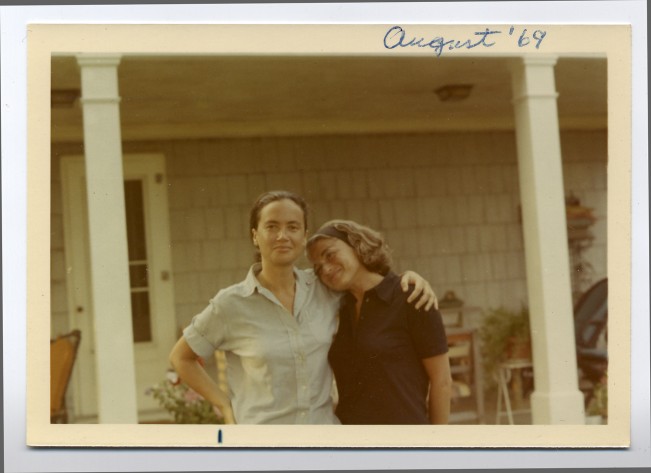By Ray Pride Pride@moviecitynews.com
Supreme Court to Hear 83-Year Old Widow’s Challenge to Defense of Marriage Act
Lesbian Couple’s 44-Year Relationship Chronicled in the Documentary Edie & Thea: A Very Long Engagement
WASHINGTON – December 7, 2012 – The U.S. Supreme Court today agreed to hear Edith “Edie” Windsor’s challenge to the constitutionality of the Defense of Marriage Act (DOMA).
After Windsor’s spouse Thea Spyer died of multiple sclerosis, Windsor, 83, was forced to pay more than $363,000 in federal estate tax because their marriage was not recognized under federal law because of DOMA. It is undisputed that if Spyer had been married to a man, instead of a woman, no estate tax would have been owed.
 Said Windsor, who sued the government for a refund after Spyer’s death in 2009, “When Thea and I met nearly 50 years ago, we never could have dreamed that the story of our life together would be before the Supreme Court as an example of why gay married couples should be treated equally, and not like second-class citizens. While Thea is no longer alive, I know how proud she would have been to see this day. The truth is, I never expected any less from my country.”
Said Windsor, who sued the government for a refund after Spyer’s death in 2009, “When Thea and I met nearly 50 years ago, we never could have dreamed that the story of our life together would be before the Supreme Court as an example of why gay married couples should be treated equally, and not like second-class citizens. While Thea is no longer alive, I know how proud she would have been to see this day. The truth is, I never expected any less from my country.”
Windsor, who achieved the highest technical rank as a software programmer at IBM, and Spyer, a clinical psychologist, met in the 1960s.
So began the extraordinary tale of Edie and Thea, whose engagement to be wed would span more than forty years. In the film about their life together, Edie & Thea: A Very Long Engagement, directors Susan Muska and Gréta Ólafsdóttir present a lovingly crafted documentary in which two lovers reminisce about how their improbable romance ignited a lifelong journey around the world and through history.
Though they were touched by events like the civil rights movement and the Stonewall riots, Edie and Thea’s relationship also transcends politics and serves as a shining example of love’s ability to endure.
Ultimately, with both women in their 70s and Thea’s health in decline, the two decide its time to fulfill their dream of getting married. The film captures their inspiring journey to Toronto – and Thea’s last trip on a plane – where the women are finally able to make their vows. Told with candor, wit, and great affection, Edie & Thea: A Very Long Engagement is an American love story for the ages. The film is available at all major retailers and on Netflix streaming.
Windsor is represented by attorneys from Paul, Weiss, Rifkind, Wharton & Garrison LLP; the American Civil Liberties Union; the New York Civil Liberties Union and the Stanford Law School Supreme Court Litigation Clinic.
“The four decades that Edie Windsor spent with her late spouse are a testament to the words ‘in sickness and in health, till death do us part,'” said James Esseks, director of the ACLU Lesbian Gay Bisexual and Transgender Project. “After building their lives together and getting married, it is unfair for the federal government to treat them as though they were legal strangers.”
In October, the U.S. Court of Appeals for the Second Circuit, in an opinion by Chief Judge Dennis Jacobs, held that Section 3 of DOMA was unconstitutional as applied to Windsor. In a historic ruling, the court held that laws like DOMA that subject lesbians and gay men to unequal treatment are presumed to be unconstitutional and are legal only if the government can point to an “important interest” that justifies the discrimination. The District Court for the Southern District of New York had previously held in Windsor’s case that DOMA was unconstitutional even under a less rigorous constitutional standard.
“As the two lower courts have now concluded, it was unconstitutional for our client to have to pay a $363,000 plus tax bill upon her spouse’s death simply because she was married to a woman, instead of a man,” said Roberta Kaplan of Paul, Weiss. “We look forward to presenting our case to the United States Supreme Court.”
The Supreme Court also agreed to hear a constitutional challenge to California’s Proposition 8, which relates to the right of same-sex couples to marry in the State of California.
“While New York and eight other states now give same-sex couples the freedom to marry, DOMA requires otherwise legally married same-sex couples like Edie and Thea to be treated by the federal government as if they had never married,” said New York Civil Liberties Union executive director, Donna Lieberman. “It is time for the Supreme Court to strike down this unconstitutional statute once and for all.”













